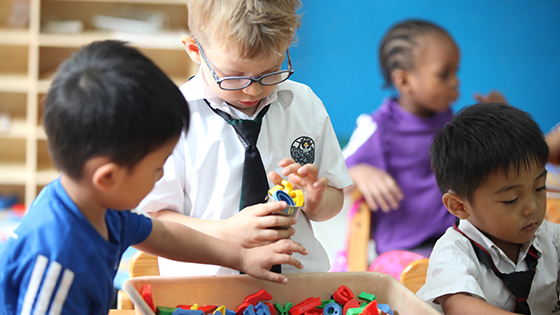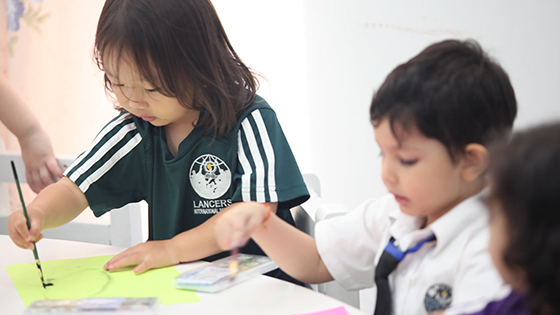International schools in Gurgaon have set a standard when it comes to sports facilities. Most of the international schools have top-notch sports trainers and coaches to train students in various sports. These schools understand the importance and benefits of sports and physical training for child development. The advantages include:
Character Building Traits
Self-confidence and self-esteem
Studies counsel taking part in sports develops a child’s certainty and shallowness. A pat on the back, high-five from a teammate, or a handshake after a match really boosts a child’s confidence. Encouragement and word of praise from the coach, parents and other players raise the self-esteem. For a child, victory or loss should not define his self-esteem. Trainers at international schools teach how constructive criticism is the key to accepting and working on weaknesses. It conjointly helps after you raise ‘did you fancy the game?’ rather than “did you win?
Discipline of International Schools
Mental, physical and tactical discipline is important for every sport. Following rules, obeying the coach, practicing restraint, etc. are all forms of discipline that sports teach them. Discipline allows folks to achieve their full potential and understand their goals – a trait prevalent in all successful people.
Social skills and teamwork
Kids playing sports learn to interact not only with kids their age but also with the older and younger players on the team, the coach, sports authorities, etc. They also develop a sense of belonging and get an opportunity to make new friends. These communication and social skills help them in their future relationships and careers.
Children learn that the team cannot win unless all of them work along and play to every other’s strengths. They also learn how not to think about self. Working together as a team is an important trait in today’s life and learning how to do so early on helps kids become better team players in professional life.
Patience and Perseverance
Practice plays an important role in improving performance in any sport. ‘Practice makes a man perfect’ but what practice and perfection need? It needs patience. Athletics teach children the way to keep active and wait and see so as to check the results. Just like patience and practice, sports also need perseverance and dedication. There are highs and lows during practice sessions and matches. Kids learn to power through and persevere even during the bad times, thus becoming stronger. Students develop better perseverance at a young age along with coping skills and critical thinking skills to face bigger situations in the future.
Manage Emotions
We know how emotions run high in sports – whether watching a sport or playing it. Channeling negative emotions can be tough for children. A good coach at an international school will help them realize how negative emotional stress could hurt their performance. Such wisdom ingrained earlier on in life will help them deal with other life challenges later on.
Respect Authority
Following a group of rules, accepting decisions and taking direction is a big part of playing any sport. Through taking part in a game, children learn how to respect coaches, referees, peers and other elders.
Leadership Skills
Becoming captain or intending to become one, naturally teaches children how to become good leaders – how to talk to other teammates, manage team emotions, take one for the team, etc. They conjointly place these skills to use outside the pitch or court creating them sensible leaders that others need to follow.
In sports, one cannot win all the time. Playing a sport teaches youngsters this truth early in life. Therefore, youngsters learn the way to simply accept defeat and lose gracefully. They learn not to get disheartened and to get up and try again. It also teaches them about healthy competition.
Lifelong Habits
Sports teaches youngsters to require care of their bodies through correct food selections and stretching. It also instills such fitness habits in them that they carry over into adulthood, keeping any health problem at bay.
Physiological Benefits
Reduces the risk of obesity
The more active someone is, the more calories the person will burn. Fitness helps in preventing fat from accumulating in the body and reducing the risk of obesity and obesity-related diseases.
Healthy growth, increased fitness and happiness
The heart is a muscle. And just like other muscles, its performance and endurance improve when regularly challenged with physical exercise. The heart becomes stronger and more efficient when children play and stay fit. A strong heart leads to a happier life and a healthy body.
Physical stress caused by exercise helps muscles, ligaments and bones to become healthier and stronger. The bone density also increases, reducing the risk which makes the bones porous and fragile.
The efficiency of lungs improves along with exercising thus increasing their capacity. This means the lungs start drawing in more oxygen and expelling out more carbon dioxide and other gasses. Regular exercise also helps prevent the decline in oxygen intake that occurs naturally with age or inactivity.
Improves coordination and balance
Any sport requires some hand-eye and foot-eye coordination. International schools have all sorts of games where students develop their coordination and balance remarkably.
Improves energy levels and sleep
Regular exercise and yoga keep children more energetic throughout the day. Also, physical exertion improves the quality of sleep and duration. There are no more sleep disorders like insomnia. Therefore, kids develop healthy routine and habits at an early age when at international schools.
Physical activity is one of the best remedies to reduce stress levels. The risk of heart diseases along with a reduction in stress levels. Regular sports activities further reduce the number of harmful fats in the blood, contributing to regulating blood pressure.
Performance Enhancement
Academic Performance
Taking part in games and athletics improve the cognitive skills and memory functions of the brain. This further improves the academic performance of the students. Further, traits such as discipline and perseverance also play an important part in a better academic performance.
Find their passion
Some kids at international schools perform exceptionally well. They enjoy their sport and decide to turn their talent into their passion and career. Such early age passion and talent help them develop their focus. Therefore, they start working towards achieving their dream. The trainers give equal support to achieve their goals.
Stay on the right track
The experts at international school know that sports require discipline and dedication. This means that kids do not get spare time. That is the reason kids do not develop or do not get time to develop bad habits such as smoking. The coaches, mentors and trainers from all over the world come to train them. They are the role models for these students who broaden their horizons and make better life decisions.





0 Comments